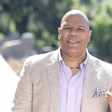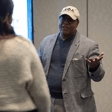Introduction with Dr. Jason Merryweather
00:00:00
Speaker
On the next couple of episodes of etho cast, we're going to take a look at preventing hazing. This week is hazing prevention week, and we're going to talk to Dr. Jason Merryweather. He's a university administrator. He's also an author, the author of dismantling hazing and Greek letter organizations.
00:00:15
Speaker
effective practices for prevention response and campus engagement. He's also a speaker one of my colleagues with Greek University and this is a week that we want to focus on making sure that people prevent one of the worst incidents that any family can deal with and that is having harm come to one of their loved ones or even losing a loved one.
00:00:40
Speaker
to something that just doesn't really have to happen in the first place.
Leadership in Greek Life with Eddie Francis
00:00:44
Speaker
Let's get into this conversation on episode new of Ethocast.
00:00:51
Speaker
Welcome to Ethocast, a podcast about sound leadership practices to boost life in college fraternities and sororities. I'm Eddie Francis, presenter of Followership to Leadership and the Black Greek Success Program, presentations designed to help Greeks become more effective leaders. On Ethocast, I'll share lessons learned from my college days, my career journey, and leadership research. Ethocast is a four-hour edification limited series and presented by edify adventures. This is Ethocast, leadership to the letter. Thank you so much for joining me on Ethocast. I'm Eddie Francis and joining me is my good brother, Dr. Jason Merryweather. He is a speaker. He's the vice president of of Enrollment Management at Campbellsville University. He's also an author, the author of this mangling, hazing, and Greek letter organizations, effective practices for prevention, response, and campus engagement.
Hazing Statistics in Greek Organizations
00:01:45
Speaker
Jason, how you doing, man? See, I have the book ready for that moment.
00:01:48
Speaker
right there and we're ready for that moment. I'm so glad to be here with you, good brother Francis. Thank you for the work you're doing. I've been watching you for a while. um You've done everything from shine life on the MPAC community and the Greek life community at large. And you've also shine so much light on HBCUs. And you know, I spent 10 years at fifth, so a lot of HBCU love there. So Thank you for the work you're doing brother. I'm glad to be on with you and a file six, a file six checkers in the mail, Fred. All right. So, um, hazing prevention week, man, hazing prevention week, a big week, every single year, not in just the Greek community, but when it comes to university community and high school community as well. Um, from a 30,000 foot view, you're someone who talks about hazing all the time. You are very busy during hazing prevention week. Um,
00:02:40
Speaker
What do you see right now as far as the state of hazing incidents and let's keep it within the Greek community? What, what are you seeing right now from a 30,000 foot view? Well, unfortunately there's so much to go around in the, in the Greek letter organization community that we can spend plenty of time later talking about outside because there's far too much happening in the community.
00:03:05
Speaker
So if you think about it this way, I keep my Google settings pretty much every way from Genesis to Revelation to capture anything that happens about hazing in high school and and athletics and of course in FSL. If I get four in a day, you know one may be outside of FSL or two may be outside of FSL, but literally every day,
00:03:32
Speaker
365 days a year, I don't even think Christmas has taken off, that I don't receive something regarding hazing in a Greek letter organization. And that is really disturbing.
Advocacy by Hazing Victims' Families
00:03:44
Speaker
It's really frightening. But if you look at a lot of the the names and the faces that are out there, you're seeing these lawsuits go on now. You're seeing more and more criminal charges. ah You're seeing families take such a strong voice in what has happened to their loved ones. Right now, even if you look at the fact that I think it's A and&E is doing a special on the the horrific injuries to Daddy Santuli. You see Timothy Piazza's name, you know, I can go
00:04:12
Speaker
to a university. And, you know, and I'm good good friends with Jim and Evelyn, Tim's parents, ah God bless both of them for the work that they're doing. But I can put Tim's face up now. And it's known. And thank the family for that, you know, I can ah put stone falls his face up. And again, a shout out to Corey and Sherry, his parents and DJ who is my my absolute dear friend and sister, his his aunt. And you know, the families have done so much work that now you know.
00:04:47
Speaker
the the faces of the people who have been harmed. You know, if you look, if if I put Max Groover's face up, people see and know that they know Colin Wynn, you know, they know George DeCindis. And I'm saying that to say that that that is what's changing, is that there's more of a face versus just a passing of the news cycle. But at the same time, concurrently,
00:05:13
Speaker
In the FSL community, what can also happen for that is that in that same news cycle, as it passes, we can also forget because there are many names and faces that are not seen and not always out there. You know, I had a chance to sit with Leanne Koliak at the Hazing Prevention Summit in Indianapolis last year.
00:05:40
Speaker
and talk with her. And you know it's just really amazing to me seeing her on campus and doing the work that she's doing and to keep that that conversation alive. So I do think that that the role of the families, and and and again, I hate all the fact that they've gone through these tragedies and and had these unnecessarily losses or this unnecessary violence. And to have those things happen,
00:06:08
Speaker
But at the same time, you're seeing the families who are getting out there who are making us remember what has happened. Um, to these young people. And so if you think about what's going on, sort of from that context, and again, and get, forgive me, let me make sure I call Harrison Koyak's name too. I mentioned his mom, but as we look at what's happening right now, there's more conversation that there's ever been than there's ever been about what's wrong, but concurrently the hidden harms are deeper and deeper and deeper than ever.
00:06:42
Speaker
And that's what's frightening right now, is that it just seems that people go deeper. There's also this perception that, oh, MPHC is this violent, vicious hazing.
00:06:56
Speaker
Uh, they're doing all this violent, vicious stuff and and we've had deaths, uh, you know, and, and, and it's, it's really crazy what we've had in the MPAC. But if you look at the abundance of what's happening right now, particularly in the IFC, well, there's this perception of drinking boys will be boys. Um, and right now I'm most worried about the court system. And I mentioned DJ Williams early. I was on her podcast and we talked about,
00:07:23
Speaker
the the the people who perpetrated the hazing acts that led to Stone false death at Bob and Green State. If you look at what happened with them, Frack, you know, 21 days, 14 days, 18 days in jail, suspended sentences, and you in and understand that wouldn't have happened without the false family fighting and showing up every day in state legislation.
00:07:49
Speaker
calling the governor, working with the president at Bowling Green State. It wouldn't have happened if they didn't show up to court every day. However, that's still not enough. If the courts can look at that family and still say, well, someone is dead, but um because my thing is this, if you rob a bank and you kill a teller while you're trying to get out of the bank, well, you're likely going to get a life sentence in prison.
00:08:14
Speaker
if the court system does its job. But hazing death is still not, I believe, seen by the courts. It's problematic. So I think that has to happen. And so people are still dying. There's still tremendous risk. And I think that that we have to get past this notion of, oh, boys will be boys because we are seeing more people charged than ever. The sentences aren't quite as strong as they should be.
00:08:40
Speaker
but we are seeing more attention and more of a spotlight. And I think that's enlarged thanks to the families because if the universities could get it right, we would have. Yeah.
Preventive Measures and Early Conversations
00:08:50
Speaker
Yeah. Speaking of the universities, you encourage Greeks, you encourage advisors and university administrators to adopt preventative approaches to anti-hazing education and policies. What does that look like? Wow. Glad to have this conversation. Okay. Now you go make me nerd out.
00:09:09
Speaker
So, okay, I think that we have to have early and honest conversations. Preventative is a big scholarly word and it looks pretty, but let's break it down a little bit. One of the things I've been telling universities for years is an orientation.
00:09:27
Speaker
We need to talk about hazing and orientation. Yes, we want people to pay their bill and register for classes. That's right. We want people to get their FAFSA so we can pull the money down and draw it down and put it on their bill and get in the refund check. We want them to know where to buy books. We want them to know where their reds, hollies, are they going to be sleeping? That's important. However, it's a great time to talk about hazing and to talk about the risk in FSL and beyond.
00:09:53
Speaker
Why do we do that? Well, you've got parents here and you've got a captive audience. Institutions are often afraid to do that. Yeah, you may have fun, you may have the bounce house and all that, but we've got to have those conversations early. Let's be real about why. Your SGA president, your orientation leaders, your tour guides and admissions are often dual members and have intersections with FSL.
00:10:20
Speaker
You know, when I was an undergrad, obviously in the frat, I was RA. I was a Senator for student government, I think for a year or so. I think I did that. Did I do that? Yeah, I think I did that. I did something with student government or another. I don't know. I know I didn't, I didn't win.
00:10:37
Speaker
I didn't win one SGA election. It was like heartbreaking, but I think I i did get to be a sender. I love it. It seems like that sticks with you. Okay. Yeah, it does. It does. You see the trauma? and yeah I'll give you a co-pay later. I have it with the therapy and the catharsis. But seriously, seriously, i I was a tour guide. I worked in the orientation office. I was an RA. I was involved in intramurals. I did all this stuff.
00:11:01
Speaker
And if you're playing, you know, if you're playing Ultimate Frisbee, and I had a heck of a throw in Ultimate Frisbee, if you're doing that, and you've got on your frat shirt, and you're at the table doing the tabling, and you're, you, maybe it's, oh, you can't wear your letters, or you're gonna slip on the pin, you're still gonna talk about it. So we're working you early, the Greeks are working these kids early.
00:11:22
Speaker
And while there are different stages where some organizations you can join as a freshman, some not, you're seeing more and more universities say, well, you got to wait a semester. You can't join in the fall. You've got to wait till spring to rush or do intake, right? Well, if we're in there and we're talking to you and we're already working you to say that, you know, it's okay. I know people are going to say this and that, and we don't talk about hazing till hazing prevention week at the end of September.
00:11:50
Speaker
And these students have had you since July to work you. it We've lost. Yeah. and and And they're already getting involved in Rush and they're already, and from outside of FSL, you already have the ones who've gone through band training or band camps. You have the athletes who've been in camps and yeah. Yeah.
00:12:07
Speaker
all of the above. So institutions have to do that early. I think the other the place for me in preventative education is really in the the peer intervention conversation.
Peer Accountability in Greek Organizations
00:12:17
Speaker
And so in I think the blue book, the Greek university book, my chapter is on Ta-da! It's on peer education and intervention, a viable tool to present hazing. We use that conversation, and it's also in this book as well, we use that conversation to frame what what it looks like to actually teach the students how to check themselves because that's where where where the real work is. So if we go back to Alan Berkowitz,
00:12:46
Speaker
In the early 2000s, he created a really strong model to combat sexual assault in frat houses, where essentially, you would say, you you see someone trying to slip someone in someone's drink. Yo, we don't do that in this house. What are you doing? Like, stop. We're not doing that. You see someone trying to get a young lady that's intoxicated behind the frat house or or upstairs. No, brother, we don't do that in this house. What are you doing? and That's not our community.
00:13:11
Speaker
And checking bad behavior that way is a great preventative tool. And so I took Berkowitz's model and restructured it to focus on hazing prevention. And so a lot of the work I do on campuses, and I'll be talking about that when I when i am visiting schools during Greek University or doing hazing with this fall on behalf of Greek University. It's really that deep conversation into how do you check this behavior, role play, engagement,
00:13:41
Speaker
encouraging and challenging chapters to talk about this during their chapter meetings, like actually putting it on an agenda and having a functional conversation about hazing and what does it mean versus what it does. Because I don't know a lot of people who are hazed who are horrible sisters and horrible brothers in their organizations. Right. Yep. And I know that we try to stigmatize that you can't be a good sister or brother if you haven't been hazed. But in fact, I know a lot of people who weren't hazed, who work harder for the organization than people who got the hell beat out of them and or be the hell out of someone.
00:14:11
Speaker
I listen, I, you know, I had this conversation with our frat brothers and and at one convention and I had a, I kind of held court with a group of undergrad brothers and I said, listen, man, I've, I've been, I've been at the time I had been in almost 30 years. I'm like, this I'm almost 30 years in. I'm here to tell you right now, all this stuff that you've heard about, you have to,
00:14:34
Speaker
go hard and done it and you have to earn it. That's great. But let me, when you cross that line in the hazing, there are no guarantees whatsoever. is that I know people who, as we, as we say in, in the divine night, who are conical paper, yeah just outworked everybody in a chapter, everybody and pay their dues and pay their dues and stayed active. for I don't know how long, but then you have the ones who said, nah, nah, I was made right. And you can't find them.
00:15:03
Speaker
You can't find them. You can't find them. Say it again. And in my world, which is the same as yours, you have these conversations. And for me, okay, all right, have you paid due? Can you actually vote at a convention?
00:15:15
Speaker
Yeah, and I was Hazed. You know, I don't deny and that I was Hazed. I'm always a little short of details because I don't ever want to come up in a deposition. But I was Hazed, right? and and And I'm always honest with people that in undergrad, I Hazed people. And when I go back and look at that, I'm like, oh my God, what was I doing? And I tell people that the the story behind why I stopped Hazing And just how how dumb I was and the the level of risk I was taking for myself. You know, I was a parent young and I was like, oh, i yeah I can't do this. You know, this is stupid. And so I'm giving you that context to say and really it really took an older, wiser fraternity brother to pull me to the side and and and and talk to me. His name was williams vo William Bonds.
00:15:58
Speaker
And I can't use all the words that that he used with me on a family podcast, but he did sort of, you know, the the two greatest conversations I've had with someone to guide me are or the the the lady in my church who guided me up the aisle when it was time to get saved to about and And then William Buns guided me up the aisle about this hazing thing. And I'm saying that to say, seriously, there's just a lot of respect for him.
00:16:24
Speaker
because he helped me look at like life afterwards. And so when we have those conversations with undergrad, we have to understand that that schools have to talk about this. And we also have to engage the organizations. I tell every VP I know, Elizabeth Allen ah does a lot of research on commitment for presidents and vice presidents, and she and I have done some research together. and You know, I tell Elizabeth, she's kind of like the Jay-Z.
00:16:48
Speaker
of of the hazing game, right? She's testified before Congress. She's just an incredible and powerful work. And the thing that that we talk about in this commitment stuff that she really does, and it's just been nice to let me write with her a couple of times, is VPs and FSL leaders We can't just know nationals' numbers when there's a crisis. right And we're calling after the fact. We have to have constant relationship and talk to people. So the other thing, preventative, I encourage and demand and write about this in the book as well, and have implemented this on my own campuses, that there has to be participation prior to rush or intake from nationals.
00:17:32
Speaker
or an APAC grad chapter leaders and nationals so that there are hands on this process. I also think that that universities like I was at Mercer University and they required every person who is interested in FSL to come to the session on hazing prevention.
00:17:51
Speaker
I spoke at Langston University. They did the exact same thing. um And you see those kind of conversations happening where we're we're just putting the education in a little bit earlier and a little bit sooner, but I think it has to start with
Inclusion of Multicultural Greek Organizations
00:18:04
Speaker
orientation. There has to be engagement. And then the peer and behavioral intervention is a key part, teaching the Greeks how to check each other. And what you see with the Greeks after I speak invariably, I was at Northern Illinois.
00:18:15
Speaker
And we were doing sessions with the Greeks, and ah they had me not only do the the big hazing prevention session, but we also did one-on-one sessions with every chapter council. And I know sometimes IFC does get a bad rap because because they they have some stuff, but I'm going to tell you, it was their IFC.
00:18:33
Speaker
who came to me and said, hey, we need you back to have this conversation in our chapters. But what I also love is that the advisors were present with the undergrads when we were having those conversations. The multicultural Greeks, often we we we we sort of leave multicultural groups out in the cold, and I think that's another key part of prevention. Because I was at, when I was in California,
00:18:56
Speaker
And my dean of students, she's a VP now, Ebony Ford Turnboat. So Dr. Ford Turnboat, she was my dean of students there. So we get invited to the LTA ah Lambda Theta Alpha sorority ah What do they call it? New member introduction. So I'm thinking, oh, they're they're gonna come out and do this thing. So I should have saw something, caught something when the flag was, what whatever whatever year they were founded. You know, like the start time was like 712 or 709 or something like that. And I should have caught something then, right? So we come in here and they come in marching. They did a victim so well, I spit it with them in my head, right? Whoa, who whoa, what's going on here? And so we also have to be cautious with with with how we include our multicultural Greeks in education too, because there's this assumption that, oh, they're young, they don't have a history, but multicultural Greeks actually do have a ah rich history and a rich support system.
00:19:59
Speaker
But sometimes if you're a multicultural group and you're way out in Montana and you're all by yourself, you just may not have anyone close. So it's really incumbent upon the universities to keep them in. And then the last thing, and I know I've talked a lot on this, is the way we support our FSL leaders.
Challenges Faced by FSL Leaders
00:20:15
Speaker
Because there's no one set up for failure on a campus more than a person who is maybe 24 years old, 25, just got out of grad school,
00:20:28
Speaker
They were maybe in an FSL chapter, maybe had a grad assistantship somewhere. And then we throw them in this job on campus and we say, hey, you're now responsible for 28 chapters with 3,000 people. You've got to manage all the councils. You've got to keep up with the programming, the volunteer service, the philanthropy, all the paperwork, every party, every event, make sure the houses are managed. And by the way, you have to manage hazing. Where's that? How's that working?
00:20:58
Speaker
I actually just saw this at a university. I just saw it. And, and I was, I was talking to the advisor and then afterwards I just walked out after I finished talking to him.
00:21:12
Speaker
I just shook my head and went, he is so overwhelmed. He is so, and I felt horrible for him, horrible. And I was sitting there thinking he's going to get burned out. The views expressed on Ethocast do not necessarily reflect the views of the hosts, guests, or any entities with which this podcast's participants are affiliated. Questions, comments, email eddie at eddiefrancis.com.
00:21:37
Speaker
You're listening to Ethocast, I'm Eddie Francis. we We're talking to Dr. Jason Merriweather and hazing prevention week is upon us, September 23rd to 27th. So I wanted to find out a long time ago, I talked to a couple of psychologists who are both Greek and I wanted to find out from them what their thoughts were about what goes through the mind of somebody who is going to commit an act of hazing.
00:22:04
Speaker
To you, what are some of the indicators that people might be able to catch? Well, this is really a timely question. And, you know, when you kind of gave me some ideas of what we're going to talk about, I was excited about this question. So Emily, Dr. Emily Perlow and Dr. Brian Joyce are conducting top notch research.
00:22:29
Speaker
on motivation for hazing. And and and they acknowledge they're standing on the shoulders of of some other folks. But the research that they're conducting is really, really powerful. And I had the opportunity, we have a ah chapter that we wrote together that'll come out I think later this fall. um And they're doing this research on this sort of situational strength.
00:22:50
Speaker
And it really looked in in and in Dr. Emily Perlow is she's like the the real big boss when it comes to work on situational strength. And if you look at what she's doing, what's really fascinating to me is that it's preparing students to engage in that space in the moment when if if you can right here in this moment combat some of the other elements that are in front of you. And it's really a first cousin to peer and behavioral intervention. but But really understanding the motivations allows you to leverage this modeling concept of situational strength. So i think I think it's just great groundbreaking research. I think we're going to see more and more of that context. And so as you look at what's happening in the world of of of hazing prevention and motivation,
00:23:41
Speaker
Right now, there are a few things that are out there. One, it's it's sense of belonging and looking for sense of belonging. Now, oftentimes that is perceived as, oh, I just am doing this so that I can fit in. Right. thanks But in point of fact, what's often happening is that sense of belonging is also in the perpetuation of hazing because I go along to get along.
00:24:07
Speaker
Yeah, I think that's a key factor that we've got to dig into. um There's there's a lot of elements of of meeting needs and the sense of if I fit in, I mean, I have a social group, or I believe that if I just go through this to get in the organization, there are going to be so many benefits and so many things that are big for me and good for me if I get in, or I'm just afraid.
The Psychology of Hazing and Belonging
00:24:30
Speaker
ah There was a case and I talk about this and I think it was at Eastern Washington University where there were like 18 people being hates and one of the the the victims um I want to read this to you one of the victims of the hazing when they asked why Did you go through this? And the victim said, essentially, I thought everyone that was in this was with it. And I didn't want to report because I thought everyone else was was just with it. I think that was Eastern Washington. And with that quote, I had it pulled up. It's gotten away from. But he said that. And then another one is in FAMU. And this is the case with Kappa Alpha Psi a few years ago. And this is one where Michael Morton
00:25:18
Speaker
who was 23, a grown man, and um ah they were, he and Jason Harris, who's 25, another grown man, were hazing Marcus Jones, who was 19 or 20 years old, to become a Catholic. And the judge gave them two years at the time, and this is what she said. This is the circuit court judge. She said, the rationale behind imposing the two-year sentence on both members was, I want to save the victims who will quietly go along because they want to belong.
00:25:46
Speaker
So I think the sense of belonging is a key part. um There's tons of other research in here that the the people who are far greater experts in motivation than me or or are talking about. But if you look at sort of that context and that that definition of motivation, I think the other key part of this that I want to make sure we touch on beyond sense of belonging is this idea of tradition and right as passage.
00:26:12
Speaker
ye that I've gotta carry this tradition and this rite of passage on within my organization. And that is pretty wild. That folks feel they have to carry that on no matter what, because I think that makes meaning for me as a human. um I think I'm protecting the organization. And so again, there are scholars who are far better than me.
00:26:41
Speaker
in the area of motivation. I definitely encourage you to to to to read, anyone to read Emily Perlow's stuff. But I'm saying that to say that as we build that out, I find that when I dig into cases, because what I do is I use case law. and And my kind of nerd space in here is I use case law and sort of reverse engineer them. And I look for that moment where someone says, you know, this is really a bad idea.
00:27:10
Speaker
For example, in the in in my book came out in March of 2020, like two days before the world shut down for the for the pandemic. And when that happened, what was really interesting is you know the book had been at the publisher since like October. So in January, news broke of a case in New Mexico, in New Mexico State, and it was involving Kappa Sigma.
00:27:33
Speaker
And ah Jonathan Silas, Silas had been shot, S-H-O-T, literally shot with a gun by Miguel Archimorano, who I think was a chapter, he was out of the pledge of deans or the chapter president or something like that. And the crazy thing about this case is he brought like a loaded nine millimeter, he brought a loaded nine millimeter into a pledge set.
00:27:58
Speaker
And they were doing this thing like this chapter loyalty oath that has nothing to do with Kappa Sigma. It has nothing to do with what they're actually doing, right? It has nothing to do with anything in the organization, any principles. This is a local thing they were doing. And this loyalty oath.
00:28:14
Speaker
that they were doing for Kappa Sigma. So I see this, so I call the publisher like, hey, I gotta open the book back up. I gotta put this in the book. And they're like, oh, you can't do that, it'll be late. Oh, we're gonna have to figure something out because I can't have this happen and write a book about hazing and this not be in the book. Had to go in the book. So I'm giving you that context to say that as we sort of dig into this thing, I open the book back up, we put it in there. And in my presentation, there's literally a picture of Johnson Silas in a hospital bed, and it's in every presentation that I do. But you're telling me someone didn't stop and say, bruh, why do you have a loaded gun? in it Why do you have a gun at all? yeah I mean, let's not even worry about why are we hazing and why are we doing this. But even if we are doing it, which we shouldn't be, why do you have a gun? If you're telling me not one person checked him, and even if someone did check him, what was going on?
00:29:11
Speaker
that we didn't stop. Yeah. that That nobody could stop what was happening. And so I think that is what's really frustrating in the world of hazing prevention. You know, Lawrence Ross, our frat brother, he wrote the divide nine and in my, my, my, the, the burgundy book, the hazing, the Smathlin hazing book, he talked specifically about engaging in PAC and, and, you know,
00:29:35
Speaker
Larry, you you know, he's him. he He came through Berkeley, old school brother. He is who he is. And he has really tough conversations about how we engage in BAC and how we keep advisors involved.
00:29:47
Speaker
You know, um I think that we've got to think about that. Walter Kimbrough, he talks about how university presidents need to be involved and ah to to go to AFA and to go to AFLV. Why do these things matter? Because these are the people who are dealing with the fall out and the carry out. Well, they need to also understand where students are and what they're thinking, what the loss is. Because no one should be caught by surprise.
00:30:11
Speaker
Right? Like, seriously, nothing surprises. If it's high school, if it's athletics, there's nothing that surprises me anymore. When you have people with .48 blood alcohol content levels, and you have people with .51 blood alcohol content levels, we are still not familiar and aware enough about motivations. We're still not familiar and aware enough about just the context of what's happening in these organizations. And so I go back to that moment in in my research of these cases that have gone to court and I use that legal precedent to frame how schools should train people. Where am I going with all that? Essentially, somebody has to have the moment, frat, where we say, this is a bad idea. So that goes right back to the peer intervention. So my tool, tying this back to the motivation question, my tool to engage this is to prepare members
00:31:06
Speaker
to simply check other behaviors and then hope someone else stands up and say, you know what, this is right. This is not who we are. This isn't what we should be doing. And hopefully we can change behaviors that way.
00:31:22
Speaker
I'm going to ask you one more question. I'm going to preface it by mentioning that I'm going to tease out the, this interview that I did years and years ago, the one I mentioned with two psychologists. I'm actually going to run that back on etho cast. And I think I did this interview. Oh my goodness. It's gotta be 12 years ago at this point or maybe a third.
00:31:41
Speaker
eleven and one of them, a friend of ours by the name of ah Von Eagle, who's now Dr. Von Eagle, and he said something so interesting about what gets into the mind of somebody who is going to commit hazing. And he said, you know, what these students often struggle with, and he he specializes in male aggressive behaviors.
00:32:02
Speaker
and He says, what these students often struggle with when they are in the moment is they wrestle with these feelings of guilt and shame. um And he said, and and I always quote Von on this. He said, ah guilt says I'm sorry for what I did. Shame says I'm sorry for who I am. that's really and And so with that being said, on a peer to peer basis,
00:32:29
Speaker
you were talking to a student right now and the student says, I really don't want any trouble in the chapter. I want our chapter to do really well. But this student says, I think I have a couple of troublemakers though. How can that student not feel a sense of shame or guilt so that they can have that tough conversation with a chapter member where they say, no, we're going to do this the right way.
Managing Disruptive Members
00:32:58
Speaker
We don't have to touch anybody. We don't have to make anybody to do anything silly. You know, let's do this the right way and bring them in the right way. Fraternity or sorority, it doesn't matter. What is that conversation? What that student look like?
00:33:13
Speaker
Oh man, that's that's a fun one. And I did while you were asking the question, take a cheat code. And I want to make sure that I want to tie it into something that Greg Parks wrote about. and Also, I think I had him on the ah podcast earlier. yeah Yeah, yeah, yeah. So Parks and also I think McCreary dug into this and so did McCreary. Dominance orientation, moral disengagement and low empathy. You've got to understand those three contexts and how they frame the the environment to which the question being asked by the subject in in the that you're posing, it stifles the asking of the question. So even before we get into a point of the question not being asked, we have to look at that concept, especially dominance orientation.
00:34:04
Speaker
Because what I heard in your question, which is what triggered me to to to pull pull it up, I didn't want to get, you know, Dr. Parks is a smart brother, I didn't want to get his stuff from wrong. So with that context, if you look at what's happening with this idea of a sort of dominance orientation,
00:34:19
Speaker
Well, you're trained, it's almost Pavlovian. You're trained to not even question the system, right? So when the person asks the question, my response, because I had been asked this, I'm pulled to the side after every other university I visit where someone talks to me and says, what do I do? Well, there are a couple of things that I'll talk about this too.
00:34:39
Speaker
There are the tools, the the real specific tools of how do you deal with the hand in hand when someone begins to attack you, particularly with men question your masculinity and sororities question your loyalty or your womanhood. All of those things happen, right? And so the the the tools should just say, OK, in the face of that, how do you keep going? So I'll talk about that first.
00:35:03
Speaker
And then I ask a few more questions about like, okay, now in the face of, are you going to get hit with these things? Okay, you are, you know, you are. Well, let's talk about how do you stand to it? How do you do this long enough for someone to join you and then be what happens if no one joins you? Do you want your chapter to exist? Because what I do in these presentations, it's sort of like when Jay-Z says, don't be the next contestant on my summer jam screen. I tell schools, I've been here. And if I leave here and you have a hazing incident, I will put you in my next PowerPoint.
00:35:34
Speaker
Then the next thing is who's the alum that you can trust to help you? oh That has a little bit of authority, a little bit of age, a little bit of stroke. Who is that alum? So there's a thing I do. I'm going to give a little bit of my presentation away. So when I talk about dealing with alumni, I have learned that the biggest perpetuators of theque the issues that led to the question that you ask are far more often alumni than I think any of us will believe. It's it's like my my next book is on hazing and athletics. That'll be out in the spring. I'm also concurrently doing the deep dive research project into how alumni are truly factoring into this. This one is going to be a lot of fun. um Why am I bringing that up? Well, Fred,
00:36:25
Speaker
Oftentimes, you're not just standing up to other students. You're standing up to the 25, 26-year-old who, and and i and I tell this sort of jokingly and colloquially, but there's a lot of seriousness in it. There's always truth and jest. When I'm talking to students, and I say, well, you know, you've got that alum that's 25 years old.
00:36:50
Speaker
They don't have a woman. They don't have a girlfriend. They're not married. They don't have a partner. They have nothing. They maybe didn't even graduate. They actually might not be an alum. Right. That's another one. and And that's across organizations. That's not just MPAC. Because listen, IFC really gets excited when I talk about that one. And so does MPC. So then they may or may not be an alum, but they're older. They might not even have a job.
00:37:20
Speaker
that They show up on campus with a faded old t-shirt that's a little too tight, not afford a new shirt. They cook the best barbecue. They're on the grill. And before you can even speak to a freshman, they're already there. And it's like, why are you in her face? Why are you in his face? What are you doing? And those are the ones whose identities are so solely constructed in the chapter, not even necessarily in the organization, but sometimes the organization, but even worse in the chapter.
00:37:48
Speaker
How do you fight that person? And so we have to talk about the engagement of other alumni. This is why the grad chapters have to be close. This is why nationals and the consultant models that that I have seen in NPCU is keeping those folks close.
00:38:05
Speaker
because you're going to need help to fight the adults who, yeah, you may legally be an adult, but you're still in college, but but the ones who are out of college with or without degree, how do you fight them? So I go through tools on how to fight the alumni because whenever I bring alumni up, it comes out over and over and
Impact of Alumni on Hazing Culture
00:38:22
Speaker
over and over again that they are the ones who are fighting to keep this in, even if we wanted out, if we decide as a chapter, we wanted out, the alumni will roll up on us like, what are you doing to my chapter? Don't you have a job? So I tell that story and and we talk about that and we have fun with it. So I'm just giving you that context to say that those are the things that we're dealing with in in that engagement. So then once you get past the alumni, who do you trust in the school?
00:38:53
Speaker
Well, then comes the fear of, I don't want to be responsible for my chapter getting snatched. yeah I don't want to get other people in trouble. Yeah, but you don't want someone to die. So this idea that I talk about of life versus tradition, because we are now playing with lives.
00:39:10
Speaker
We are now playing with lives. And so I give you that context to say that all of those are tools and conversations that we talk about. And then it can get deeper based on what's happening in the chapter. um I was at a school in Georgia. And even though what happened with Max Gruver happened that at LSU, he was from Georgia. So I was at a school in Georgia that wasn't too far from where he grew up. So there were people who knew him. So when I brought him up, you know, they come to me and they're like, I knew him. I went to high school with him.
00:39:37
Speaker
I don't want that in my chapter. My chapter, I feel like some of those same things are happening. And so that's the kind of stuff that we have to really impact. And I think it's also helping folks know you're actually not alone in wanting to save your chapter. Yeah. Yeah. Yeah. Strong and saving the chapter looks different to some people saving the chapter means perpetuate the hazing, the harm and the violence and the drinking, which is also violence because people are dying.
00:40:02
Speaker
So it's digging into those elements, but it goes back to how do we fight the very culture that prevents a young student, woman or man, or whoever's in this organization from asking how do I check the bad behavior? yeah So it's getting them to be sort of not alone in that process. And that's really, really difficult, but often real time, that's where it goes. And if I can convince someone, one time I was at a school, I won't say the state of the location, because I don't want you to like trace where I've been and give that school away. But once I had someone talk to me about something that was happening, it took me an hour to convince them to talk to the Dean of Students.
00:40:51
Speaker
And they wanted to, but they were so afraid of what would happen to them. Rightfully. So they were not cowards. They were afraid. Like literally someone might hurt me. Yeah. And so that it goes back to that idea of the dominance orientation that happens in sororities and fraternities. Yeah.
00:41:13
Speaker
Dr. Jason Merryweather. He is a speaker, also author of dismantling hazing and Greek letter organizations, effective practices for prevention, response, and campus engagement. and Thank you so much for a great conversation.
00:41:26
Speaker
Brother, thank you for having me, Fred. I'm really grateful. As I said in the beginning, you've been doing great work for a long time. I'm really honored to be a part of it. I wish everyone a lot of great, healthy conversations. There are incredible people doing this. I'm clearly not the only one. I always try to throw shout outs to the researchers and scholars and speakers, and most of all, to honor and acknowledge the parents who are doing this work. But it's just really critical and important to me that no matter who you bring to your campus, to work with student athletes,
00:41:56
Speaker
if it's to your high school, if it's working with your band or student orgs, you know, I went to Ohio State and they have all their Greeks, all their student athletes, even the football team and the man, all in the big room going through. Taking it seriously at that level is huge. And so for me, no matter who your speaker is, although I'm glad to be going to places I'm going, no matter who your speaker is, I think it's really critical that you just follow up with those conversations. You know, don't let this, it's like my pastor used to say growing up in in Guthrie, Kentucky, Jesus done came and went and you missed the Holy Ghost, right? Don't let a speaker come to your campus, give you all this information, especially if it's ah a family or a parent talking to you, and then they're gone and you go back to business as usual.
00:42:48
Speaker
take Take the information seriously. if it's This fall, I'm going to be at Jacksonville University, ah Millersville University, but now I'm spending a lot of time in Pennsylvania, Johns Hopkins. I think I'm going to Henderson State. I'm going to University of Tennessee at some point. A lot of great stuff happened. if If I left you out, my agent will get me for that, but I didn't mean to. But but those are just the places I'm thinking of because I just looked at my flights recently. But for the places I go, when I try to leave with them,
00:43:14
Speaker
And if you bring me to your campus, what I'll try to leave with you is this any the same thing that other speakers will will try to leave as well. And it's really simple. It is. Use this stuff. Whether you think we're entertaining or not, whether we we we we trigger your emotions and you're sad or it's it's really deep for you, use the information we're giving you.
00:43:40
Speaker
If a family's speaking to you, hear the loss, but also, and this is what I do, focus on that moment of, wow, what would I have done if this is my chapter? I could have checked this. And and that's where I come in with this context of life versus tradition.
00:43:59
Speaker
Yeah, we can keep what's going on in the chapter. That's great. But is it really worth another person dying?
Consequences and Accountability in Hazing Incidents
00:44:05
Speaker
In our own fraternity, and I can't do this and not not get our own fraternity, Eddie, I have to do this. yeah In California, when Tyler Hilliard was murdered, killed during a Golden Paddle event,
00:44:25
Speaker
What I talk about in, in, in when I framed that case is when Myesha Kimball Hilliard, his mother confronted our, the guys wearing our letters in the hospital, she confronted them. And you know what they did? They didn't say, yeah, we were hazing them. They didn't say, yeah, we we knew what we were doing. We did what we did. They lied. Hmm.
00:44:55
Speaker
they They told her, we don't know what happened to him. We were going on a hike and he just passed out. that that That was cowardice. They didn't even have the guts to be honest with the mother in the moment they lied. Think about the case ah of Michael Dang, Michael Choon Dang. I think this was at a we do dodada Upstate New York, Upstate New York, Binghamton. I think it was at Binghamton.
00:45:25
Speaker
And that they left him in the Poconos trying to clean up all the evidence. I've read many, many times that is it for Tim Piazza, instead of just leaving him, had someone just called the police, Tim might still be alive right now. That's the kind of stuff that we have going on that these people perpetrate this. And then they're not even woman enough or man enough. They don't even have the humanity.
00:45:53
Speaker
to not lie about the consequences. To this day, Kristen High and Kenitha Saffir. We know there was a settlement. We know that AKA paid a lot of money, but but but but from a position, AKA is still not taking ownership. In in the and in the the documentary, ah the hazing documentary, what's crazy is the family still doesn't have answers.
00:46:24
Speaker
Because the chapter members who were out there on that beach, when those young women drowned, they still don't have closure. And this is Byron Hertz's hazing ah documentary, which is just incredible, powerful. omega Omega Man, incredible, powerful documentary. Watch that, play that.
00:46:44
Speaker
But I'm saying all that to say that everything that's happening, the people who are perpetuating this don't even have the the the the will to at least admit that they were wrong in the face of the family. So my question is this, and this is where I leave you, and I know you didn't ask me a question, we're supposed to be wrapping up, but but I leave you with this, brother. If you cannot face a mother, a father, a grandparent,
00:47:14
Speaker
an aunt, an uncle, a cousin, a child. If you can't face them and say, yeah, I was hazing your child, if you can't face them and you're going to cower and lie, this woman met her son's killers in the hospital. And if we don't want to call them killers, then we'll say that the people who perpetuated the hazing violence that led to his death, if you feel better about that, but she met her son's killers who are wearing our letters, brother,
00:47:43
Speaker
And they couldn't even look her in the face and tell the truth. They lied and still trying to hide it. If you can't even do that, if you can't even tell the truth to a mother who's grieving, watching her son die, you don't need
Conclusion and Importance of Ongoing Dialogue
00:47:53
Speaker
to be hazing. And I'll leave it there. Jason, man, thank you so much for the work you're doing. And honestly, thank you so much for the passion that you have for talking about this. Um, and I really appreciate you, man. Thank you for joining me on Ethocast. Thank you for our brother. Glad to be here.
00:48:10
Speaker
Ethocast is a four-hour edification limited series. If you like what you heard, like and follow this podcast for more leadership insights for your fraternity or sorority chapter. To find out how you can bring followership to leadership or the Black Greek Success Program to your campus or a campus near you, email today, eddy at eddyfrances.com. Until next time, spread brotherly and sisterly love wherever you go.




















